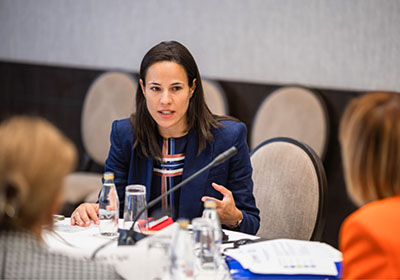
Global Initiatives
NARUC's global initiatives cover the following:
Cost-Reflective Tariff Toolkit
With the support of the United States Agency for International Development (USAID) Energy Division, Center for Environment, Energy, and Infrastructure, Bureau for Development, Democracy, and Innovation (DDI), NARUC has developed a Cost-Reflective Tariff Toolkit consisting of a series of primers focusing on the regulator’s role with achieving cost-reflective tariffs.
Each primer is short and practical, and is meant to be used by utility service regulators in countries with emerging economies in order to design rates that are based on actual cost of service and to effectively engage the public and key stakeholders in the decision-making process. You can access all of the primers here.
Increasing Gender Equity in the Energy Sector

Gender inequity in energy and regulation has been a longstanding challenge, prohibiting growth and sustainability and affecting energy services, labor, and decision-making. Studies have shown that when women are given the opportunity to take on larger roles within regulatory agencies, they have a positive impact on management, operation, and growth of their institutions.
For regulators and policymakers, the need to consider gender goes far beyond greater representation within regulatory agencies and the energy sector as a whole. Intentional efforts must be made to ensure that gender-specific considerations are included in policy and regulatory frameworks. Countries around the world are increasingly recognizing the value and need for gender equity, and some have set specific gender-based goals in policymaking and energy sector reform.
Mini-Grids
Mini-grids are emerging as a key option for countries working to expand electricity access for their citizens. According to the International Energy Agency, more than half of the world’s rural populations without electricity would best be served by mini-grids rather than stand-alone systems or extending national grids.
One of the main obstacles to realizing the promise of mini-grids is the absence of an enabling regulatory regime. Developers may not have the political and legal certainty to invest in projects, and countries may lack the necessary technical and regulatory standards to unleash development.
To address this issue, USAID and NARUC developed the Practical Guide to the Regulatory Treatment of Mini-Grids. This guide provides regulators with concrete guidance and practical tools for developing a clear, enabling regulatory framework for mini-grid development.
New Regulator Assessments
The existence of a sound, transparent, and stable regulatory body and process is important for the government, consumers, and investors alike. With that said, new regulatory organizations often face a number of common challenges upon their inception (e.g., staffing all positions, building technical capacity, acquiring sufficient autonomy, etc.), as well as sector-specific challenges in asserting regulatory authority and achieving the institutional capacity sufficient to fully execute regulatory functions. If these challenges are left unaddressed, the regulator will face greater difficulty in creating an enabling environment for investment in the energy sector and meeting national energy goals.
With funding support from USAID, NARUC provides assistance for new regulators in the form of conducting organizational assessments and performing gap analyses. Organizational assessments serve to analyze a new regulator’s current regulatory situation, organizational structure, and energy sector goals as a means of assessing where regulatory assistance is needed and developing a strategic framework for growth. Gap analyses can complement these assessments by identifying any challenges that limit the regulator’s overall effectiveness and providing recommendations to build technical and operational competency.
Our Funders

